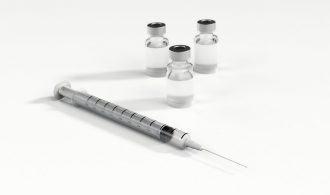Some content may contain affiliate links to products which means we could earn a fee on your purchase. Thank you for visiting
While Parvo occurs most often in puppies before they’ve been properly vaccinated, any dog at any age is capable of contracting Canine Parvo. What’s worse is that vaccination does not preclude a dog from getting Parvo. It is not all that different than a human contracting the flu virus even though they received a flu shot vaccine.
Can my older dog get Parvo after vaccination?
Yes, even though the Parvo vaccine and Parvo boosters are highly effective, they are not 100%. Older dogs and young dogs can contract Parvo even if they’ve been vaccinated and received all boosters. That’s why seeking treatment at the first signs of Parvo is absolutely critical.
If your dog is showing symptoms of
- Vomiting
- Bloody Stool
- Diarrhea – Can be severe, watery and/or bloody
- Fever
- Loss of Appetite
- Weight Loss
- Lethargic, No Energy.
It is critical to take these signs seriously, especially when accompanied by any other symptoms. Seek medical attention immediately. And if your dog does have parvo, he has a 90% chance of surviving when he gets early treatment.
Why Parvo Vaccine Doesn’t Always Work
While they are generally very effective, there are always exceptions. Here, we will discuss the main reasons why a parvo vaccine doesn’t always work.
Break in Chain or Series of Parvo Vaccines
Puppy Series – The parvo vaccine for puppies requires a scheduled series of vaccinations in order for that puppy to be protected. Most veterinarians will give at least two after 6-8 weeks and another around 12- 14 weeks and one more a year later. Any break in chain could mean that the puppy is not protected.
Adult Dogs Boosters– Adult dogs require boosters and the recommendation is at least every 3 years. This means that the Parvo vaccine is slowly losing effectiveness as an adult dog approaches the need for her booster.
Forgetting to schedule your adult dog for his booster is one reason adult dogs are not protected from Parvo. However, even if you remember the booster, there is always the possibility that the vaccine protection wore off months before the booster was due.
Because of this, many dog owners are visiting veterinarians who offer titer testing for Parvo antibodies.
Titer testing tests a dog’s blood for Parvo antibodies. Titer testing is becoming especially popular in dogs that don’t do well with vaccines, which may be ill or in declining health, who’ve poorly responded to other vaccines and especially with breeds having a genetic predisposition for contracting Parvo.
Breed Predisposition to Parvo
Rottweilers, American Pit Bull Terriers, Doberman Pinschers, and German Shepherds are at increased risk of canine parvovirus. It’s important to remember that your dog may have none of these breeds in her genetic makeup, but still, no breed is immune to contracting Parvo. If you have no idea what breeds make up your older dog and have always wondered, check out this article regarding Dog DNA Test: Is it Worth It.
Again, many owners of these susceptible breeds find titer testing very useful. Using a titer test to measure the amount of antibodies can be a big help for owners who have to make decisions about booster shots more frequently than every 3 years.
Parvo Treatments OTC vs. Veterinarian Dose
Some vaccines are simply more effective than others. As owners worry about over-vaccination, or the costs associated, they may turn to over the counter remedies and/or mail order remedies.
While there can be a variance in quality from one veterinarian to the next, typically the vaccines given to and used in veterinarian offices are among the best when it comes to quality. Many factors go in to quality control of the vaccine itself. For instance:
Vaccines expire and most require safe storage such as refrigeration and no sunlight. While distribution centers may go to these lengths, you’ll want to be sure by asking whether or not they’ve been properly stored. .
Dog’s Individual Immune System
Vaccine failures regularly occur in cats and dogs…and humans for that matter. There simply is no guarantee that your dog’s immune system will respond positively to being vaccinated.
So Why Bother Vaccinating Against Parvo?
Every decision we make for our dogs is personal and for every opinion supporting our decisions, we can find an equal amount of opposing. These days is seems as though deciding whether to give your dog vaccines is as argued as whether or not you should feed your dog kibble vs. raw.
What’s a dog owner to do? Do your research and go into your veterinarian appointment armed with the questions that concern you. This way, you are informed AND your dog gets the benefit of professional advice. Your Veterinarian may bring to light a current problem in the region where you live. They have their finger on the pulse of outbreaks and should absolutely be included in your decision making.
Personally, I vaccinate my dog because all of my veterinarians suggest it and my research of canine parvovirus case studies provided me with enough positive information.
Here is a snippet of what some of my case study research showed – I like to use the National Library of Medicine, National Institute of Health and Pubmed:
The results of this study confirmed that dogs vaccinated subcutaneously with a commercially available multivalent vaccine containing modified-live canine distemper virus, canine adenovirus type 2, canine parvovirus type 2b, and canine parainfluenza virus antigens were protected against sequential experimental challenge 55 to 57 months after initial vaccination given at 7 to 8 weeks of age. All 10 vaccinates were protected against clinical diseases and mortality following parvovirus and infectious canine hepatitis experimental infections. All vaccinates were protected against mortality and 90% against clinical disease following distemper challenge. These data support at least a 4-year duration of immunity for these three “core” fractions in the combination vaccine.
Conclusion
I hope the most important take away from this article is that you ACT IMMEDIATELY if your dog – vaccinated or not – shows any of the symptoms associated with Parvo.
If you are treating a dog at home with parvo, you’ll want to make sure you have the right cleaners. For instance, lysol and spic and span do not kill parvo. This guide shows what does: Cleaners that Kill Parvo Guide.
Can older dogs get parvo if they have been vaccinated? YES, and Immediate medical treatment helps save lives. Here is an entire article on the dangers of Parvo in OLD Dogs. The symptoms again are:
- Vomiting
- Bloody Stool
- Diarrhea – Can be severe, watery and/or bloody
- Fever
- Loss of Appetite
- Weight Loss
- Lethargic, No Energy.
Thanks for visiting SeniorDogDays!

